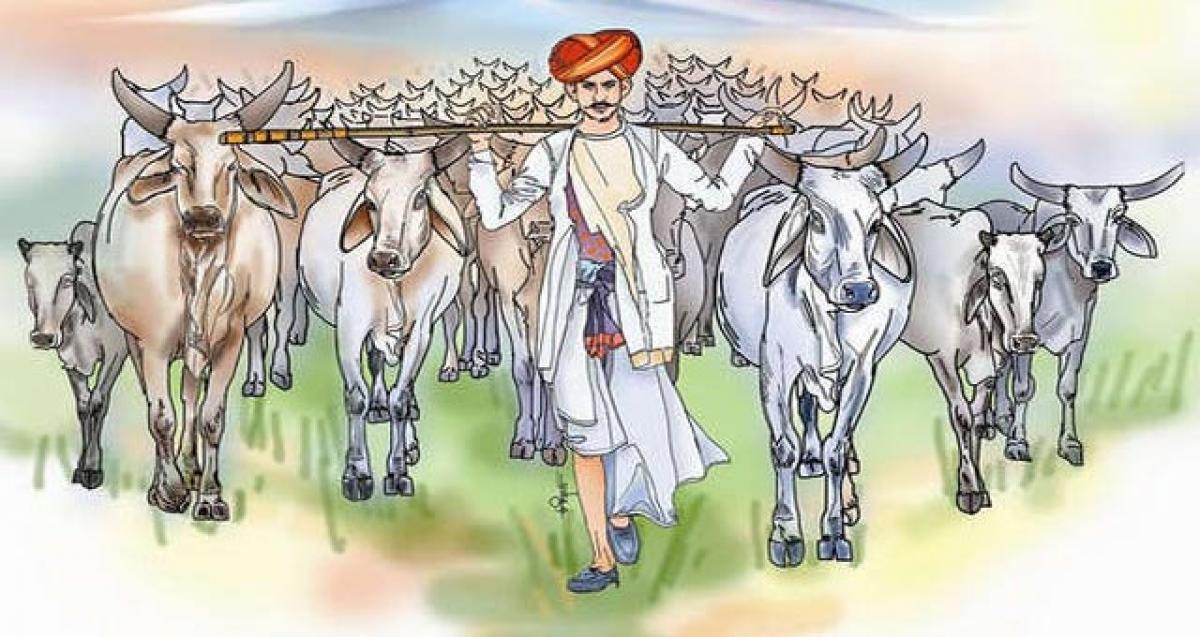Live
- Chanchalguda Jail Officials Say They Haven't Received Bail Papers Yet, Allu Arjun May Stay in Jail Tonight
- BJP leaders present evidence of illegal voters in Delhi, urge EC for swift action
- Exams will not be cancelled: BPSC chairman
- Nagesh Trophy: Karnataka, T.N win in Group A; Bihar, Rajasthan triumph in Group B
- YS Jagan condemns the arrest of Allu Arjun
- Economic and digital corridors to maritime connectivity, India and Italy building vision for future, says Italian Ambassador
- SMAT 2024: Patidar's heroics guide Madhya Pradesh to final after 13 years
- CCPA issues notices to 17 entities for violating direct selling rules
- Mamata expresses satisfaction over speedy conviction in minor girl rape-murder case
- Transparent Survey Process for Indiramma Housing Scheme Directed by District Collector
Just In

Of late several alternative propositions have been put forth by various individuals working for environment protection, safeguarding human health and socio-economic betterment, to mould farmers of the country towards a tangible and profitable farming.
Of late several alternative propositions have been put forth by various individuals working for environment protection, safeguarding human health and socio-economic betterment, to mould farmers of the country towards a tangible and profitable farming. Subhas Palekar is one among the several in this line. His proposition of farming 30 acres of land through one desi cow christened as Prakruthi Vyavasayam attracted a few groups of farmers besides some politicians and administrators. In that context the state administrators have taken a lead to reform the research and extension wings of the state by training the individuals in all the institutes concerned through Palekar.
Agricultural scientists and students have expressed dismay over the derogatory remarks made on the science of agriculture as well as the shapers of green revolution in the country, during the course of trainings. The organizers defending the views of the Prakruthi Vyavasayam creator have gone to the extent of offering him with an honourary doctorate through university. Can we expect that this Prakrithi Vyavasayam to save the main stakeholders of agriculture in the country? Why are the policy makers projecting this as alternative, while encouraging free trade in GM seeds and toxic chemicals that enhance farm input costs besides proving detrimental for environment and human health?
In the early part of new agriculture that is intertwined with chemicals and machines, few individuals negated this modern approach in farming. MaSanobu Fuku-oka of Japan was one among them, who through his, ‘The One Straw Revolution,’ proposed natural farming wherein there is no role of land preparation, seeding/planting in rows, inter-cultivation, manuring, interventions for plant-protection or to that extent any interference in obtaining food from plants.
Such attempts or propositions were put forth by several individuals in other Asian countries besides in other continents even during the expansion stage of new agriculture itself. In India, Sir Arther Howard, one of the founders of Indian Science Congress, loudly appreciated the traditional adoptive techniques of Indian farmers as being more valuable than the new western external input methods. However, these propositions did not stand the test of time as evidenced in food famines due to crop failures. Scientists and politicians were forced to expand new methods in farming too, for sufficient food to the growing populations.
Several organisations concentrated to evolve and expand sustainable organic based techniques by indigenous innovations. Many such societies showed some way to many small land holding farmers even in most fragile agro-ecological systems. However, since these dilute the profits or targets of companies that produce chemicals, machines, improved seeds etc, they resorted to bigotry methods in the guise of green technologies. The propaganda and short gain approaches of companies and modernity mania of scientists masked the sustainability of safe tools in farming too.
The craving nature of even governments for miracle seeds and highly toxic chemicals besides several new machinery developed for Israel-like country, naturally exposed the hypocrisy of policy makers. At this juncture this Prakruthi Vyavasayam entered the scene. This proposition lacks some rationality unlike other organic input and sustainable technologies put forth hitherto. Waste of one cow can restore fertility by activating macro and micro-organisms and fill tonnes of organic matter drained by the preceding crop in 30 acres of land – this is irrational and unscientific.
Second, proposing to stick to desi breed of cow at this stage where large sections of farmers in India depend on buffaloes and cross breed cows for milk and draught purpose is not appropriate. Third, without taking into consideration of land relations and transformations in socio-economics in rural areas, the advice of cow rearing for dung or urine, this proposal is put forth. His belief that vermin compost through non-indigenous earthworms is dangerous is unfounded. Fourth, skipping intervention techniques even in short duration crops and depending on slow acting organics is impracticable. Fifth, though IPR regime made seeds costly, denying the role of improved seeds is most unscientific approach.
So as a whole, at this stage just preaching Prakruti Vyavasayam or cow-centric farming is utopia and untimely. Countries like Cuba, China, Japan, Vietnam, Korea show a way for alternatives where soil organics can be restored through town composts and agro-industrial wastes, besides recycling crop residues as well as human dwelling wastes for crop production. Modern knowledge facilitated to interfere with crop pests and diseases by selective microbial inputs.
The role of monitoring and forecasting of interfering organisms is well-developed in those countries, where agro-ecology and human health are equally taken care. Small machinery that create little damage to soil structures are prioritised in those systems where hands on farming are reduced. Without fighting an IPR system and strengthening regulatory bodies in the country, besides rectifying land relations, there is no meaning in such cow-centric alternatives. (Writer is convener of Rythu Rakshana Vedika)
By Prof N Venugopal Rao

© 2024 Hyderabad Media House Limited/The Hans India. All rights reserved. Powered by hocalwire.com







